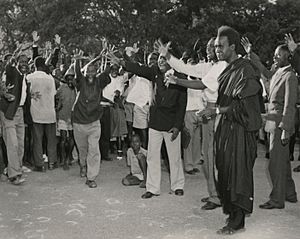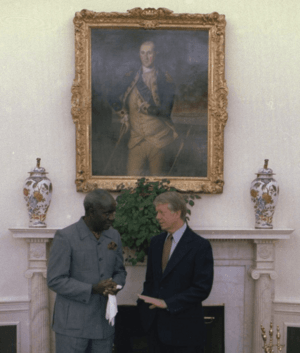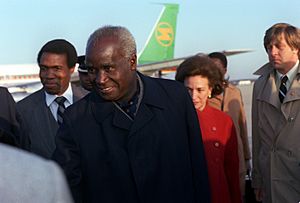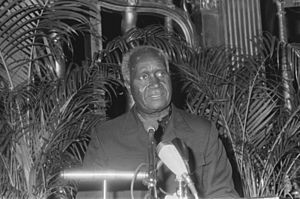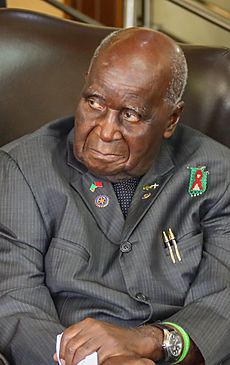Kenneth Kaunda facts for kids
Quick facts for kids
Kenneth Kaunda
GCIH SCOT
|
|
|---|---|
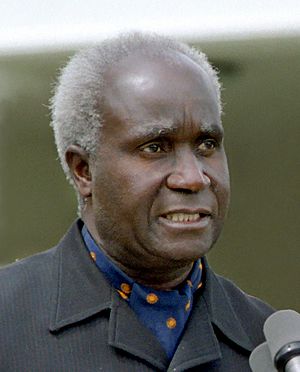
Kaunda in 1983
|
|
| 1st President of Zambia | |
| In office 24 October 1964 – 2 November 1991 |
|
| Vice President | |
| Preceded by | Sir Evelyn Hone as Governor of Northern Rhodesia |
| Succeeded by | Frederick Chiluba |
| 3rd Chair of the Non-Aligned Movement | |
| In office 8 September 1970 – 5 September 1973 |
|
| Preceded by | Gamal Abdel Nasser |
| Succeeded by | Houari Boumédiène |
| Personal details | |
| Born |
Kenneth David Kaunda
28 April 1924 Chinsali, Northern Rhodesia (now Zambia) |
| Died | 17 June 2021 (aged 97) Lusaka, Zambia |
| Resting place | Embassy Park, Lusaka |
| Citizenship |
|
| Political party | UNIP |
| Spouse | |
| Children | 8, including Tilyenji |
| Profession | Teacher |
Kenneth David Kaunda (28 April 1924 – 17 June 2021), also known as KK, was a very important Zambian politician. He became the first President of Zambia in 1964 and served until 1991.
Kaunda was a key leader in the fight for Zambia's independence from British rule. He helped create the United National Independence Party (UNIP), which played a big role in gaining freedom.
After Zambia became independent, Kaunda led the country for many years. In 1973, he made UNIP the only political party allowed. This was done to stop violence between different groups. During his time, the government also took control of major foreign-owned companies.
However, Zambia faced economic problems, especially after the 1973 oil crisis. Because of pressure from other countries, Kaunda eventually allowed other political parties again. In 1991, Frederick Chiluba won the election, and Kaunda peacefully stepped down from power.
Early life and education
Kenneth Kaunda was born on 28 April 1924 in a place called Lubwa Mission in Chinsali. This area was then known as Northern Rhodesia, but it is now part of Zambia. He was the youngest of eight children.
His father, Reverend David Kaunda, was a missionary and a teacher. His mother was also a teacher, and she was the first African woman to teach in colonial Northern Rhodesia. Both of his parents taught among the Bemba people in northern Zambia. Kenneth's father passed away when he was young.
Kaunda received his education at Lubwa Mission until the early 1940s. He then followed in his parents' footsteps and became a teacher. He taught in Northern Rhodesia and later in Tanganyika Territory (now part of Tanzania) and Southern Rhodesia. From 1941 to 1943, he attended Munali Training Centre in Lusaka. Early in his career, he was inspired by the writings of Mahatma Gandhi.
He worked as a teacher and headmaster at Lubwa from 1943 to 1945. He also worked in mines for a short time. In 1948, he became a teacher in Mufulira. During this period, he was also a leader for the Pathfinder Scouts Association and a choirmaster.
Road to independence and presidency
In 1949, Kaunda started his political journey. He helped create the Northern Rhodesian African National Congress. In 1953, he moved to Lusaka to become the Secretary General of this group, working with Harry Nkumbula.
Kaunda and Nkumbula tried to unite African people against the Federation of Rhodesia and Nyasaland, which was controlled by Europeans. In 1955, both leaders were jailed for two months for sharing materials that challenged the government.
Later, Kaunda and Nkumbula disagreed on how to lead. Kaunda then started his own party, the Zambian African National Congress (ZANC), in October 1958. ZANC was banned in March 1959, and Kaunda was imprisoned for nine months.
While Kaunda was in prison, other leaders formed the United National Independence Party (UNIP) in October 1959. When Kaunda was released in January 1960, he was chosen as UNIP's president. In 1960, he visited Martin Luther King Jr. in the United States.
In July 1961, Kaunda organized a peaceful protest campaign in Northern Province, known as the Cha-cha-cha campaign. This involved blocking roads and other actions to show disagreement with the government.
Kaunda ran as a UNIP candidate in the 1962 elections. This led to a government where UNIP and the ANC worked together. Kaunda became the Minister of Local Government. In January 1964, UNIP won the next big elections, and Kaunda became prime minister. On 24 October 1964, Zambia became an independent country, and he became its first president. He appointed Reuben Kamanga as his vice-president.
Education for all
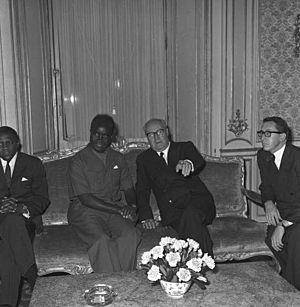
When Zambia became independent, its education system was not very strong. There were only about a hundred university graduates and few people with secondary education. Kaunda's government decided to invest a lot in education.
He introduced a policy where all children received free exercise books, pens, and pencils. Parents only had to buy uniforms and pay a small school fee. This helped many children get a good education, from primary school to university.
The University of Zambia opened in Lusaka in 1966. People across the country donated money to help build it. Kaunda became the head of the university and attended the first graduation ceremony in 1969. Later, another campus was opened in Kitwe, which became the Copperbelt University in 1988.
Many other training colleges were also started during Kaunda's time. These included colleges for technical skills and teacher training.
Economic changes
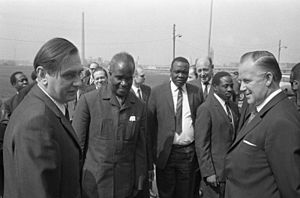
When Kaunda became president, Zambia had a strong economy because of its rich mineral deposits, especially copper. However, many of these businesses were owned by foreign companies. For example, the British South Africa Company still controlled many mineral rights. Kaunda worked to get these rights back for Zambia.
His government created plans for national development, focusing on building infrastructure and factories. In 1968, Kaunda started the Mulungushi Reforms. These reforms aimed to bring foreign-owned companies, especially mining ones, under Zambian control. Many mining companies were taken over by the government.
However, Zambia's economy faced challenges from 1973 onwards. Oil prices went up, and copper prices went down, which reduced the country's income. Zambia ended up owing money to the International Monetary Fund (IMF). Kaunda tried to make economic changes in the 1980s, but the country's financial problems continued. These economic difficulties played a part in his eventual loss of power.
One-party rule and "African socialism"
In 1964, before independence, there was violence involving the Lumpa Church. Kaunda temporarily banned the church and ordered its leader's arrest.
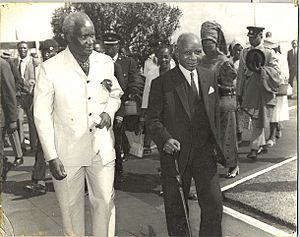
Over time, Kaunda's government became less tolerant of opposition. After violence during the 1968 elections, Kaunda banned all political parties except UNIP. In 1972, he faced a new challenge when Simon Kapwepwe left UNIP to form a new party. Kaunda quickly tried to stop this new party.
He then set up a commission to create a new constitution that would make Zambia a one-party state. This meant UNIP would be the only party allowed. In 1973, the new constitution was put in place. In the elections that followed, Kaunda was the only candidate.
With no other parties, Kaunda promoted an idea called Zambian Humanism. This was a mix of central planning by the government and traditional African values like helping each other and being loyal to the community. Similar ideas were also used in other African countries. Kaunda wrote several books explaining his ideas.
As the leader of UNIP, Kaunda was the only candidate for president in the elections of 1978, 1983, and 1988. Each time, he won with a large majority of votes.
Foreign relations
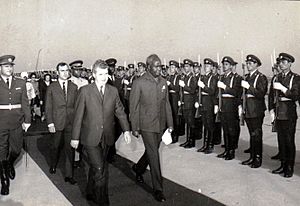
During his presidency, Kaunda strongly supported the movement against apartheid (racial segregation) in South Africa. He also opposed white minority rule in Southern Rhodesia (now Zimbabwe). He allowed black nationalist groups from Rhodesia, South West Africa (now Namibia), Angola, and Mozambique to use Zambia as a base. Leaders like Oliver Tambo and Joshua Nkomo lived and worked in Zambia during their fight for freedom.
Kaunda often tried to get modern weapons from the United States to protect Zambia, but his requests were usually refused. In 1980, he bought fighter jets from the Soviet Union. He explained that he had to buy from somewhere to protect his country.
From 1975 to about 1984, Kaunda was a key African leader in solving conflicts in Angola, Rhodesia, and Namibia. He met with US presidents like Gerald Ford and Jimmy Carter and worked with American officials. He generally had a good relationship with the United States.
In 1975, Kaunda helped mediate talks between the Prime Minister of South Africa and black nationalist leaders at the Victoria Falls Conference. He also tried to help achieve majority rule in South West Africa.
The conflicts in southern Africa put a huge economic strain on Zambia. To help with trade, Kaunda negotiated the building of the TAZARA Railway. This railway connected Zambia to Tanzania's port of Dar-es-Salaam on the Indian Ocean. It was the only way for Zambia to trade without going through white-controlled territories. This situation lasted for over 20 years until apartheid ended in South Africa.
During the Cold War, Kaunda was a strong supporter of the Non-Aligned Movement. This movement included countries that did not want to take sides with either the United States or the Soviet Union. He hosted a big meeting for this movement in Lusaka in 1970 and was its chairman for three years. He was also good friends with Yugoslavia's leader, Josip Broz Tito.
Kaunda often had friendly disagreements with US president Ronald Reagan and British prime minister Margaret Thatcher. He felt they were not doing enough to fight apartheid in South Africa. He always had good relations with China, which helped Zambia with many projects, including the Tazara Railway.
Kaunda was also chairman of the Organisation of African Unity (OAU) twice, from 1970 to 1971 and again from 1987 to 1988.
Leaving power
Things changed quickly in 1990. In July, after some riots in the capital, Kaunda announced that people would vote on whether to allow other political parties. He initially argued that a one-party system was better to prevent chaos.
Hours after his announcement, there was an attempt to overthrow him, but it failed. Kaunda then tried to calm the opposition by changing the date of the vote.
Even though he was willing to let people vote, Kaunda still believed that only a one-party state could prevent tribalism and violence. However, by September, strong demands from the opposition forced him to change his mind. He canceled the vote and instead agreed to change the constitution to allow other parties. He also announced an early general election for the next year.
In these elections, the Movement for Multiparty Democracy (MMD), led by Frederick Chiluba, won by a huge margin. Kaunda lost the presidential election, getting only 24% of the votes compared to Chiluba's 75%. His party, UNIP, won only 25 seats in the National Assembly of Zambia.
When Kaunda handed over power to Chiluba on 2 November 1991, he became one of the first African leaders to allow free multi-party elections and peacefully step down after losing.
After presidency
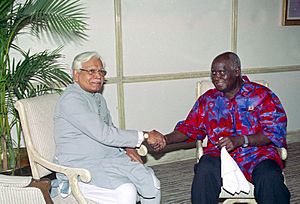
After leaving office, Kaunda often disagreed with Chiluba's government. Chiluba even tried to say that Kaunda was not a Zambian citizen. The government also changed the constitution to stop people with foreign parents from becoming president, which would have prevented Kaunda from running in future elections.
After a coup attempt in 1997, Kaunda was arrested but later placed under house arrest. In 1999, a court declared him stateless, but he successfully challenged this decision, and the Supreme Court of Zambia confirmed he was a Zambian citizen.
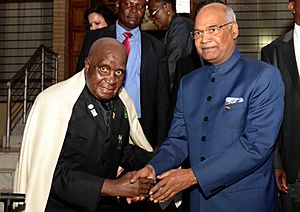
On 4 June 1998, Kaunda announced he was stepping down as UNIP leader and retiring from politics. After retiring in 2000, he worked with many charity groups. He was especially passionate about fighting the spread of HIV/AIDS. One of his own children passed away from the disease in the 1980s.
In September 2019, Kaunda said he felt it was sad that the late president Robert Mugabe was criticized by some people who were against his efforts to bring social justice to Zimbabwe.
Personal life and death
Kaunda married Betty Banda in 1946, and they had eight children. Betty passed away in 2012 at the age of 84. Kenneth Kaunda was famous for always wearing a safari suit (a safari jacket with trousers). Because of this, the safari suit is still often called a "Kaunda suit" in many parts of Africa.
He also wrote music about the independence he hoped for. One of his well-known songs is "Tiyende pamodzi ndi mtima umo," which means "Let's walk together with one heart."
On 14 June 2021, Kaunda was admitted to Maina Soko Military Hospital in Lusaka. He was being treated for an illness that was later revealed to be pneumonia, a problem he had faced before. On 17 June 2021, he passed away at the age of 97 after a short illness. He was survived by many grandchildren and great-grandchildren.
Kaunda believed his long life was due to his strict lacto-vegetarian diet. He said, "I don't take meat, no eggs, no chicken, I only eat vegetables like an elephant." He also avoided alcohol and stopped drinking tea in 1953.
Zambia's President Edgar Lungu announced 21 days of national mourning for Kaunda. His remains were taken on a funeral procession around the country, with services in each provincial capital. A state funeral was held in Lusaka on 2 July, and he was buried on 7 July.
Several other countries also announced periods of mourning, including Zimbabwe, South Africa, Botswana, Malawi, Namibia, Tanzania, Mozambique, South Sudan, and Cuba.
Awards and honours
Foreign honours
 Grand Cross of the Order of Prince Henry (Portugal)—28 May 1975
Grand Cross of the Order of Prince Henry (Portugal)—28 May 1975 Supreme Companion of O. R. Tambo (South Africa)—10 December 2002
Supreme Companion of O. R. Tambo (South Africa)—10 December 2002 Commander of the Most Courteous Order of Lesotho (Lesotho)—4 October 2007
Commander of the Most Courteous Order of Lesotho (Lesotho)—4 October 2007 Honorary Member of the Order of Jamaica
Honorary Member of the Order of Jamaica
Awards
- On 21 May 1963, he received an honorary degree of Doctor of Laws from Fordham University.
- On 19 October 2007, Kaunda received the 2007 Ubuntu Award.
See also
 In Spanish: Kenneth Kaunda para niños
In Spanish: Kenneth Kaunda para niños
- Michael Sata
- Harry Nkumbula
- Simon Kapwepwe
- History of Christianity in Zambia
 | Misty Copeland |
 | Raven Wilkinson |
 | Debra Austin |
 | Aesha Ash |


